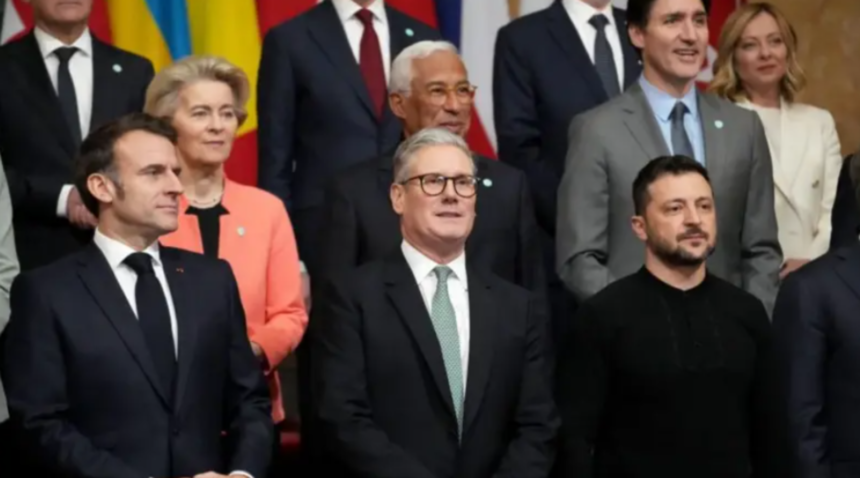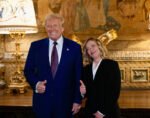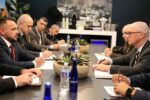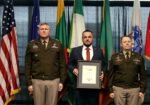British Prime Minister Keir Starmer stated that Europe must take the lead in ensuring peace in Ukraine, while suggesting that some countries are ready to assist in protecting any potential peace agreement.
The British leader once again called for U.S. support to prevent Russian President Vladimir Putin from violating any possible ceasefire agreement. He made these statements after welcoming dozens of European leaders and NATO officials to London.
The summit was held two days after a clash between Ukrainian President Volodymyr Zelensky and U.S. President Donald Trump at the White House.
“Europe must take the lead, but to support peace on our continent and to succeed, this effort must have strong support from the U.S.,” said Starmer after the meeting.
The British Prime Minister and French President Emmanuel Macron have both stated that they are prepared to deploy troops to Ukraine to help maintain peace if an agreement is signed to end the war that began in 2022.
The two officials are leading efforts to form a group of states that would contribute in various ways to this cause, and Starmer referred to this group as the “coalition of the willing.”
“A number of countries made it clear today that they want to be part of the plan we are developing,” said Starmer, who did not name the countries involved.
Starmer mentioned that the countries that have expressed willingness “will intensify planning with urgency.”
“Not all countries feel they are in a position to contribute, but that doesn’t mean we stand idle,” he added.
Starmer said that the world is at a crossroads and now is the time to act.
“This is not the time for more talks. It is time to act. Time to rise up, lead, and unite around a new plan for a fair and sustainable peace.”
U.S. President Donald Trump has yet to commit to providing security guarantees, but Starmer added that discussions are based on “what will have U.S. support.”
“I wouldn’t be on this path if I didn’t think it would produce positive results in securing that we move together — Ukraine, Europe, the UK, and the U.S.,” he said.
However, Italian Prime Minister Giorgia Meloni seems to have downplayed the possibility of Italy contributing to a peacekeeping mission, stating that “the presence of Italian troops in Ukraine at this stage has never been on the agenda.”
Before the London summit, Starmer said that his country, France, and Ukraine are working on a ceasefire plan that will be sent to the United States.
French President Emmanuel Macron, German Chancellor Olaf Scholz, and Italian Prime Minister Giorgia Meloni were among the dozens of European leaders who joined Starmer and Zelensky for talks in London.
Canadian Prime Minister Justin Trudeau and Turkish Foreign Minister Hakan Fidan also participated in the security summit.
A day earlier, British Prime Minister Starmer welcomed Zelensky to his office, and after their meeting, it was announced that Ukraine would receive a loan worth $2.84 billion.
“This loan will increase Ukraine’s defense capabilities and will be repaid using revenues from frozen Russian assets,” Zelensky said via social media.
This is not a game-changing amount but provides some comfort for Zelensky after his unprecedented and harsh confrontation with U.S. President Donald Trump, after which he left the White House on February 28 earlier than expected and empty-handed.
The conference in London gained new significance after this confrontation in the Oval Office, and the revival of the relationship between Trump and Zelensky is likely to be a major point on the agenda.
NATO Secretary-General Mark Rutte — who attended the summit — earlier said that Zelensky must find a way to improve the relationship. It is still unclear if such an outcome is achievable. However, Trump stated that Zelensky could return “whenever he wants peace.”
Before the summit, Starmer held a separate meeting with Italian Prime Minister Giorgia Meloni. She could play an important role in Europe’s efforts to convince Washington that it needs to support Ukraine.
Meloni, a supporter of Ukraine, is also ideologically close to Trump, who has praised the Italian leader.
Even before Zelensky’s visit to Washington, European leaders had shown urgency in making themselves important to the Trump administration.
This was triggered by statements from senior U.S. officials who suggested that Europe would not be directly involved in peace negotiations for Ukraine and due to signs that the U.S. and Russia are improving their relations.
Other preliminary talks on the crisis were held in Paris last week and focused on whether Europe could form a peacekeeping force to be deployed in Ukraine after a ceasefire or peace agreement, as well as achieving goals to increase defense spending.
The winner of the most recent parliamentary elections in Germany, Friedrich Merz, stated a week ago that Europe must “become independent” from the United States.
After Zelensky’s visit to Washington, German Foreign Minister Annalena Baerbock said that she would support measures to help Ukraine “withstand Russian aggression even if the United States withdraws its support.”
“This is a historic test for Europe,” said Czech Prime Minister Petr Fiala on March 1. “It must take care of its own security.”
After the summit, Zelensky, during his stay in the UK, also met with King Charles III.
The meeting with Charles highlights Britain’s support for Zelensky and its desire to act as a bridge and peace broker between Washington and Kyiv.







